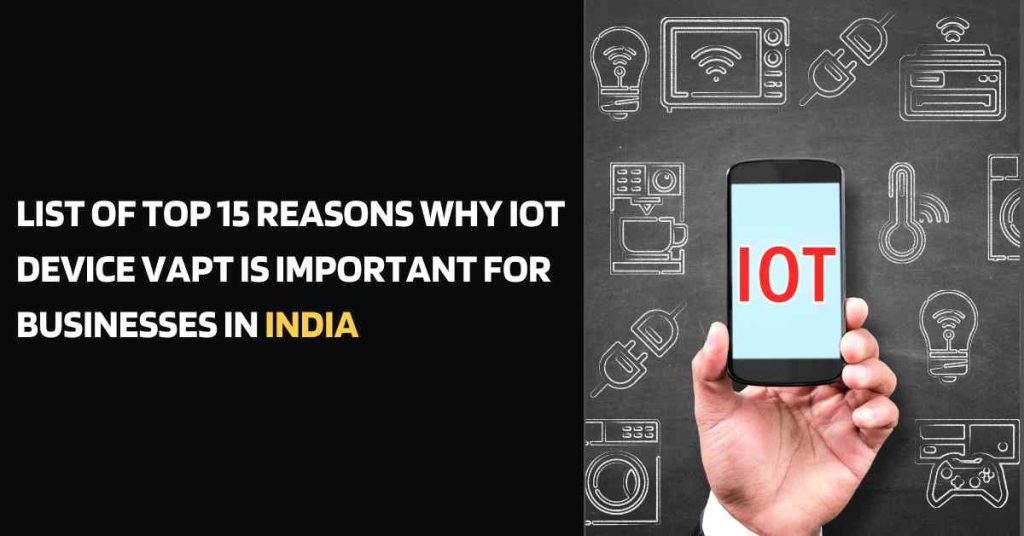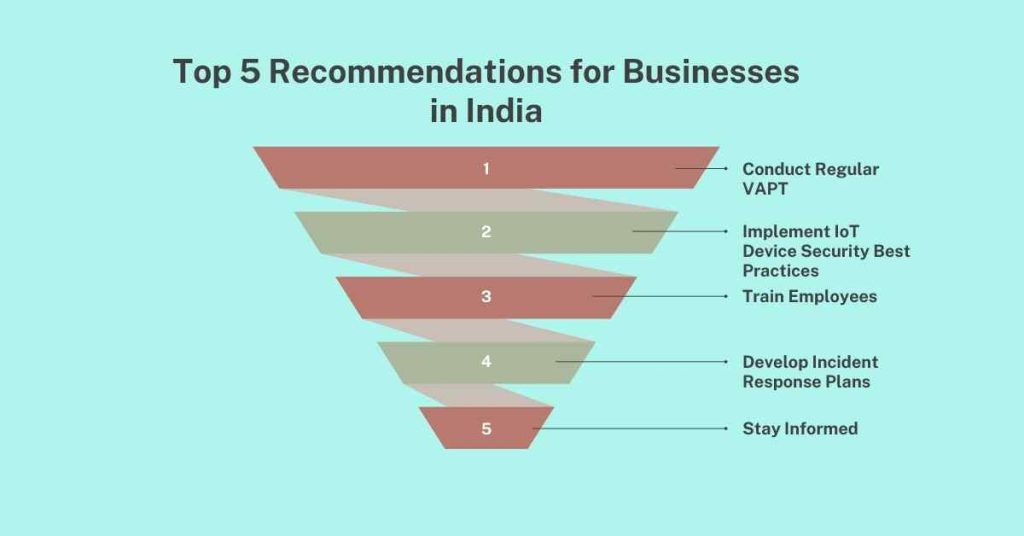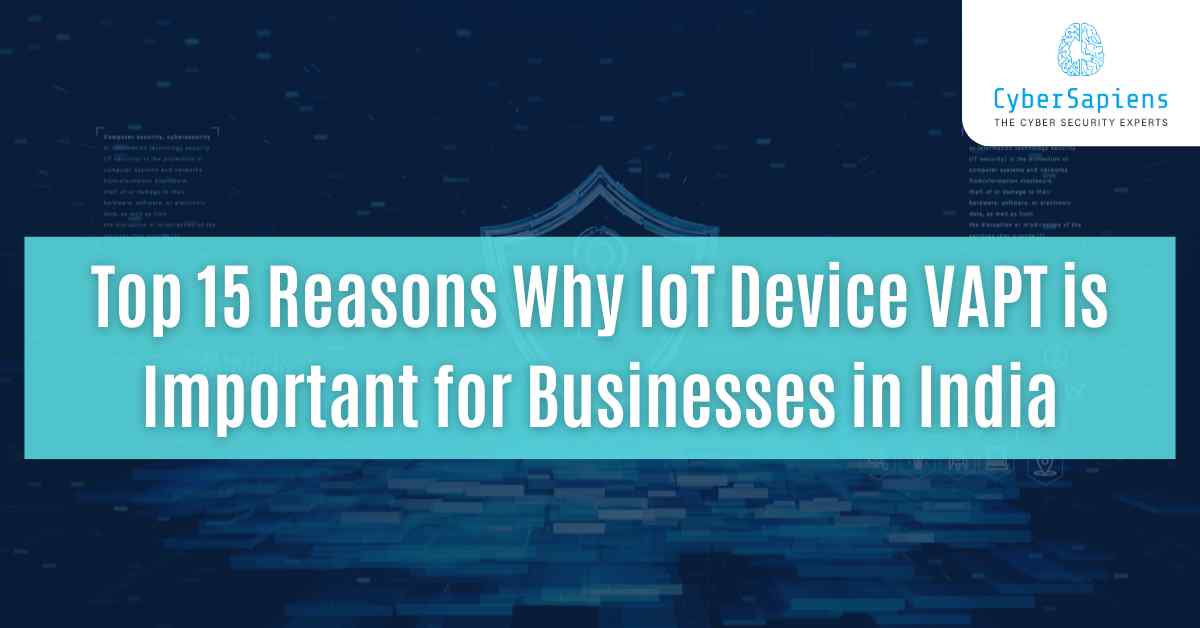The Internet of Things (IoT) has revolutionized how businesses operate in India, enabling them to streamline processes, improve efficiency, and reduce costs.
However, the increasing adoption of IoT devices has also introduced new security risks, making it essential for businesses to prioritize Vulnerability Assessment and Penetration Testing (VAPT) for their IoT devices.
This article will explore the top 15 reasons why IoT device VAPT is crucial for businesses in India, highlighting the importance of proactive security measures to protect against cyber threats.
List of Top 15 Reasons Why IoT Device VAPT is Important for Businesses in India

Here is the list of the Top 15 Reasons Why IoT Device VAPT is Important for Businesses in India:
1. Growing IoT Adoption in India
Currently, the growth in IoT is very high in India as the number of devices connected up to 2025 is 2.7 billion.
With IoT devices being integrated into businesses in India, the risk increases, making VAPT necessary to determine dangers or risks that may exist.
2. Increased Risk of Cyber Attacks
There are several types of attacks that the IoT ecosystem is prone to, and they include; malware attacks, ransomware, and Distributed Denial of Service (DDoS) attacks.
VAPT enables one to identify the areas of vulnerability in any IoT device to enable any business to take precautions against such attacks.

3. Protection of Sensitive Data
IoT devices process and store such forms of information as customer data where customers, financial records, and other personal information might be accessed through IoT devices.
VAPT will help to ensure, that only authorized users have access to the IoT devices, and important data is protected.
4. Compliance with Regulatory Requirements
Businesses in India also have to adhere to many rules and regulations, such as the Information Technology Act 2000 and the General Data Protection Regulation (GDPR).
The training assists the businesses in the facilitation of the regulations by pointing out the areas that may have security risks.
5. Prevention of Financial Losses
Malware attacks on IoT devices have severe financial consequences for companies.
This is a risk that VAPT avoids by pointing out an apology area of compromise that can be exploited such that the enemy cannot succeed.
6. Enhanced Customer Trust
The companies in India that ensure most of the IoT devices used are secure show the customer data privacy and cyber attack prevention standards. In so doing, customer trust and loyalty are improved.
7. Reduced Risk of Physical Harm
Devices in industries like healthcare, manufacturing, and critical infrastructure become a threat to human life if heist.
It ensures also that potentially exploitable weaknesses are revealed which could otherwise endanger the lives of people.
8. Improved Operational Efficiency
Through VAPT, organizations can discover some of the issues with IoT devices, and thus, reduce overall costs of operation.
9. Better Incident Response
In matters of security breaches, VAPT offers more insight to IoT devices a business may have and consequently assists in a quicker management of the attack.
10. Protection of Intellectual Property
There is a need for organizations in India to develop IoT devices to safeguard the welfare of their intellectual property against piracy. VAPT is used to identify exposure areas that may threaten the strength of IP.
11. Reduced Risk of Reputation Damage
The unauthorised access to the IoT devices may harm the reputation of the business and it degrades the customer loyalty of the business. VAPT helps to avoid such attacks and thereby avoid erosion of image or reputation.
12. Improved Compliance with Industry Standards
VAPT ensures that organizations meet the safety requirements expected of IoT devices, as provided by the IoT Security Foundation and NIST.
13. Enhanced Business Continuity
Thus, making it easier for any business to experience business continuity in circumstances such as a security breach or any other disruption, VAPT.
14. Protection of Supply Chain Integrity
IoT devices are used for managing different operations in the supply chain, and, therefore, the risks that threaten the supply chain must be mitigated.
15. Future-Proofing IoT Devices
Since IoT devices are gradually being developed, and they come with new features or models, security threats and risks are also being developed. The VAPT enables organisations to approach IoT device safety with a future view by helping to identify risks that are likely to arise in future.
Top 5 Recommendations for Businesses in India

By following the below recommendations and prioritizing IoT device VAPT, businesses in India can protect themselves against cyber threats, maintain business continuity, and ensure a secure IoT ecosystem.
1. Conduct Regular VAPT
Frequent VAPT allows for early detection and elimination of likely threats so that attacks cannot be easily executed.
2. Implement IoT Device Security Best Practices
The IoT device security standards should be followed by different businesses applying the secure code, secure communication standards, and frequently updating the software.
3. Train Employees
Each employee should undergo training on IoT device security and its implication on the secure configuration and use of devices.
4. Develop Incident Response Plans
Companies need to attempt the implementation of incident response plans to protect their organization in the case of a breach.
5. Stay Informed
It is imperative that businesses put necessary precautions on new IoT device threats and risks as they continue to come up to avoid any prevail.
Summary
Here is the summary for the blog title ” Top 15 Reasons Why IoT Device VAPT is Important for Businesses in India “.
- Growing IoT Adoption in India
- Increased Risk of Cyber Attacks
- Protection of Sensitive Data
- Compliance with Regulatory Requirements
- Prevention of Financial Losses
- Enhanced Customer Trust
- Reduced Risk of Physical Harm
- Improved Operational Efficiency
- Better Incident Response
- Protection of Intellectual Property
- Reduced Risk of Reputation Damage
- Improved Compliance with Industry Standards
- Enhanced Business Continuity
- Protection of Supply Chain Integrity
- Future-Proofing IoT Devices
Conclusion
In conclusion, IoT device VAPT is essential for businesses in India to protect against cyber threats, ensure compliance with regulatory requirements, and maintain business continuity.
By prioritizing VAPT, Indian businesses can safeguard their IoT devices, protect sensitive data, and stay ahead of emerging security threats.
As the IoT landscape continues to evolve, businesses must remain vigilant and proactive in their approach to IoT device security.
FAQs: Top 15 Reasons Why IoT Device VAPT is Important for Businesses in India
1. What is the IoT device VAPT?
Ans: IoT device VAPT (Vulnerability Assessment and Penetration Testing) is a process of identifying and mitigating potential security vulnerabilities in IoT devices to prevent cyber attacks and ensure the security of sensitive data.
2. Why is IoT device VAPT necessary for businesses in India?
Ans: IoT device VAPT is necessary for businesses in India because it helps protect against cyber threats, ensures compliance with regulatory requirements, and maintains business continuity. With the increasing adoption of IoT devices in India, VAPT is essential to safeguard against potential security vulnerabilities.
3. What are the benefits of IoT device VAPT?
Ans: The benefits of IoT device VAPT include identifying and mitigating potential security vulnerabilities, protecting sensitive data, ensuring compliance with regulatory requirements, and maintaining business continuity. It also helps prevent financial losses, enhances customer trust, and reduces the risk of reputation damage.
4. What types of IoT devices require VAPT?
Ans: All IoT devices that handle sensitive data or are connected to the internet require VAPT, including smart home devices, industrial control systems, medical devices, and wearable devices.
5. How often should IoT device VAPT be conducted?
Ans: IoT device VAPT should be conducted regularly, ideally quarterly or every six months, to identify and mitigate potential security vulnerabilities. However, the frequency of VAPT may vary depending on the type of IoT device and the level of risk associated with it.
6. What is the difference between vulnerability assessment and penetration testing?
Ans: Vulnerability assessment involves identifying potential security vulnerabilities in an IoT device, while penetration testing involves simulating a cyber attack to test the device’s defenses and identify potential entry points.
7. Can IoT device VAPT be conducted in-house or should it be outsourced?
Ans: Both in-house and outsourced VAPT options are available. However, it is recommended to outsource VAPT to a reputable security testing firm to ensure objectivity and expertise.
8. What are the common security vulnerabilities found in IoT devices?
Ans: Common security vulnerabilities found in IoT devices include weak passwords, outdated software, insecure communication protocols, and lack of secure coding practices.
9. What are the consequences of not conducting IoT device VAPT?
Ans: The consequences of not conducting IoT device VAPT include potential cyber-attacks, data breaches, financial losses, and reputation damage. It can also lead to non-compliance with regulatory requirements, resulting in fines and penalties.
10. How can IoT device VAPT be integrated into a business’s overall security strategy?
Ans: IoT device VAPT should be integrated into a business’s overall security strategy by including it in the organization’s risk management plan, implementing secure coding practices, and conducting regular security audits and testing.












